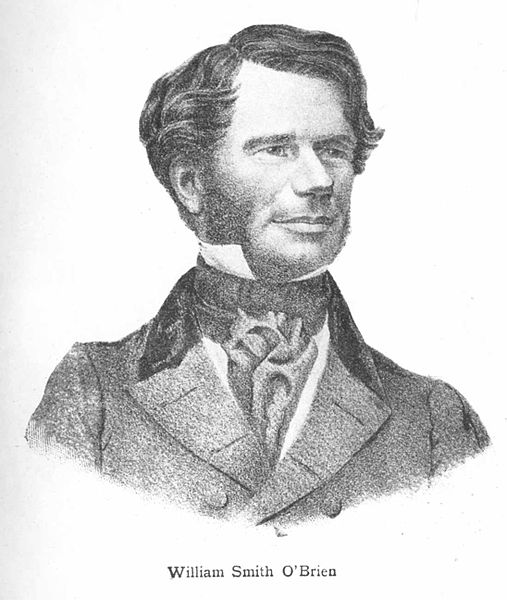I have been
thinking a lot about John Martin today. This day marks the passage of 200 years
since he took his first breaths in a small Irish cottage in the townland of
Loughorne in County Down. John was the much desired heir of a prosperous
Presbyterian family.
While this
might be interesting information for those of us who share parts of his family
tree, this anniversary would seem to be of little interest to the general
public. But the terrible years through which he lived and how he conducted
himself provide clear lessons for us in our painful times.
Let me
explain how he deserved the title of “Beloved Politician” that I have given him
as well as the title by which he was known during his life, “Honest John
Martin.” If it hadn’t been for the Irish
Famine that devastated Ireland when he was a young man, he would have remained
a private small landowner, much loved and admired by his friends, neighbors and
tenants for his kindness and generosity. When he saw his nation’s need, he gave
up all he cherished to help.
John was a
man of strong principles that governed his life, principles that are useful to
remember to day.
He believed
in doing the right thing, not just when doing so was easy, but especially when
doing so was very hard, when the price for doing so very high. Ireland was
ruled by the English Parliament, and the laws to deal with the Famine were
passed in London with little influence from the Irish. First John protested,
then John joined those who were actively resisting British laws. The English
government considered him a great threat, had him arrested and charged with
treason. He was convicted in a rigged trial and sent off to exile in Tasmania. This injustice did not make him bitter. He
knew he had done his best to do the right thing for his country. He only
regretted that he hadn’t succeeded.
John
believed in the obligations of citizenship. He was first a landlord with
responsibilities to the tenants who worked his farm. He would not allow them to
starve during the Famine though paying for their food forced him to mortgage
his land, reducing him from financial comfort to financial distress the rest of
his life.
For him,
citizenship meant more than a call to serve his friends, and neighbors. It was
an obligation to country as well, to serve his country, not fight for power.
There came a time late in his life when he was the most powerful and most
respected man in Ireland. For a few months, he enjoyed the acclamation of his
countrymen. But when others stepped forward, he stepped back. But he didn’t
step away. He continued to explain the Irish point of view in the English
Parliament of which he was then a member.
Finally,
John believed in the obligation to lead a moral and ethical life. No one could
ever provide a better example. Like many others, he was an active member of his
Presbyterian church, but he always went the extra mile. When the church needed
land to build a manse for their minister, John gave them the land. He followed
his religion’s call to serve the needy, using his medical training to provide
free medical care for the poor.
This belief
guided his political career as well. He would never participate in any project
that wasn’t ethical. So people recognized that whatever project John Martin
participated in was a worthy one. He never hated his opponents, even those who
had attacked and belittled him. When he ran for a seat in Parliament, elections
were bought by the powerful. John required his supporters to run a totally
honest election, no bribery, no intimidation of voters, no slandering of his opponent.
His victory shocked England, Ireland and America.
I often
think about the leaders of today, and how much better we would all be if they followed
John Martin’s pathway, leaders who did the right thing, leaders who believed in
the obligations of citizenship, and who always strove to lead moral and ethical
lives.
So Happy
Birthday John. How I wish I could have spent an hour in your presence. How I
wish that I could have given you just one hug. On this special day, as we
remember you, I make you a promise. Those who so admire you will never allow
you and your exemplary life to be forgotten.




